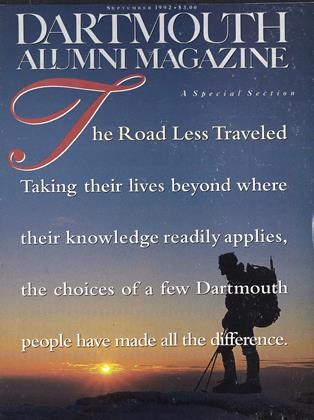"The opportunityfor originalintellectualwork in closecollaborationwith faculty isone of the mostimportant andattractive aspectsof Dartmouth."
I AM REGULARLY STRUCK by the number of students who tell me that the most valuable academic experience they have had at Dartmouth involves working closely with a faculty member. If you have had a close working relationship with a faculty member yourself, you will readily understand the value of such an association with a senior scholar. One of my goals is to expand the opportunities for such collaboration.
Dartmouth currently offers a number of distinct programs designed to encourage independent academic achievement:
The venerable Senior Fellowship Program permits ten or 12 highly motivated students to work during their entire senior year on a single independent project that will contribute to their intellectual growth. These students work under the guidance of faculty advisors and, just before Commencement, defend their work orally before a faculty examining committee.
Last year senior fellows engaged in sophisticated scientific research ("Tempnet Rhythm System: A Temporally Sensitive Neural Network" and "A Molecular Analysis of Cell Cycle Using Antisense Oligonucleotides"), wrote novels and short stories, and made a documentary film about "The New Order in Bucharest, Budapest, and Sofia."
The Presidential Scholars Program, established in 1987, enables qualified undergraduates to do independent work in collaboration with faculty. Presidential scholars work in their junior year with professors on research projects and then complete honors theses during their senior year. Approximately 130 students are currently in the program.
The Women in Science Project, established in 1990, is designed to encourage freshmen women to pursue their interests in science, math, and engineering and to consider graduate study careers in those fields. Developed to help meet the worldwide need for more scientists and engineers and to alleviate the underrepresentation of women in scientific fields, the program invites women to participate in a challenging program of internships, seminars, mentoring, and field trips. The program was developed by deans Karen Wetterhahn and Carol Muller '77.
The Mellon Minority Academic Career Fellowships Program, designed to encourage minority undergraduates to pursue careers in college teaching, offers five juniors and five seniors supervised independent research and a non credit weekly seminar. The program is directed by Professor Elaine Jahner and supported by a six year grant from the Andrew W.Mellon Foundation.
The Ernest Everett Just Program in Science for Minority Undergraduate Students, established this year under the leadership of Professor George Langford, is designed to encourage AfricanAmerican students to pursue studies in the sciences. It is patterned after the Women in Science Project. Honors programs within each department enable eligible students to undertake supervised independent work. Typically, candidates for honors or high honors in their major complete a thesis or its equivalent under the supervision of an advisor; they may be required to take honors courses, seminars, or examinations as well.
The Creative Writing Program, in the English Department, lets students work closely with distinguished writers. The program does not expect that each of the students will go on to be the Robert Frost of the twenty-first century, but it does recognize that the process of creative writing also teaches careful reading and writing, not to mention soul searching reflection. In addition to that program, as a result of the generosity of Harle and Kenneth Montgomery '25, we have this year created the Creative Writing Reading Series in order to afford Dartmouth students the opportunity to hear novelists and poets read from their works, as well as to meet and talk with these writers in classes and informal settings. Recent Dartmouth participants have been Donald Hall, J. M. Coetzee, Gore Vidal, Deborah Digges, and Stanley Kunitz.
Dartmouth continues to maintain more than 40 study abroad programs in 15 nations. More than 60 percent of Dartmouth undergraduates study overseas with Dartmouth faculty in groups of fewer than 20 students.
In April, the Faculty of Arts and Sciences voted "that each department and program include among its major requirements a culminating activity, normally during the senior year, academically challenging and appropriate to the discipline and mission of the department or program. The requirement may involve individual projects (theses, directed research and writing, laboratory research, creative projects), senior seminars, group tutorials or colloquia, or some combination of these." As these culminating activities are introduced across the curriculum, they will ensure that all Dartmouth graduates engage in an academic activity that is the intellectual capstone of their undergraduate studies.
This roster of opportunities for original intellectual work in close collaboration with faculty is one of the most important and attractive aspects of Dartmouth's commitment to enrich the academic experience of our students.
 View Full Issue
View Full Issue
More From This Issue
-
 Feature
FeatureSecond Chances
September 1992 By Mary Cleary Kiely '79 -
 Feature
FeatureFishing The River For A Monument
September 1992 By John Scotford '38 -
 Feature
FeatureTo An Athlete, Aging
September 1992 By Mark Lange '84 -
 Feature
FeatureCommunion With The High Places
September 1992 By Andrew Daniels '85 -
 Cover Story
Cover StoryChoices
September 1992 By Jay Heinrichs -
 Article
ArticleDr. Wheelock's Journal
September 1992 By "E. Wheelock"
James O. Freedman
-
 Article
ArticleORIGINALS AND COPIES
JUNE 1991 By James O. Freedman -
 Article
ArticleA Postponed Power
May 1993 By James O. Freedman -
 Article
ArticleThe Time Allotted Us
June 1994 By James O. Freedman -
 Article
ArticleThe Education Gap
January 1996 By James O. Freedman -
 Article
ArticleStaying Out of the Groove
SEPTEMBER 1997 By James O. Freedman -
 Feature
FeatureAn Honor, To a Degree
Sept/Oct 2002 By JAMES O. FREEDMAN








